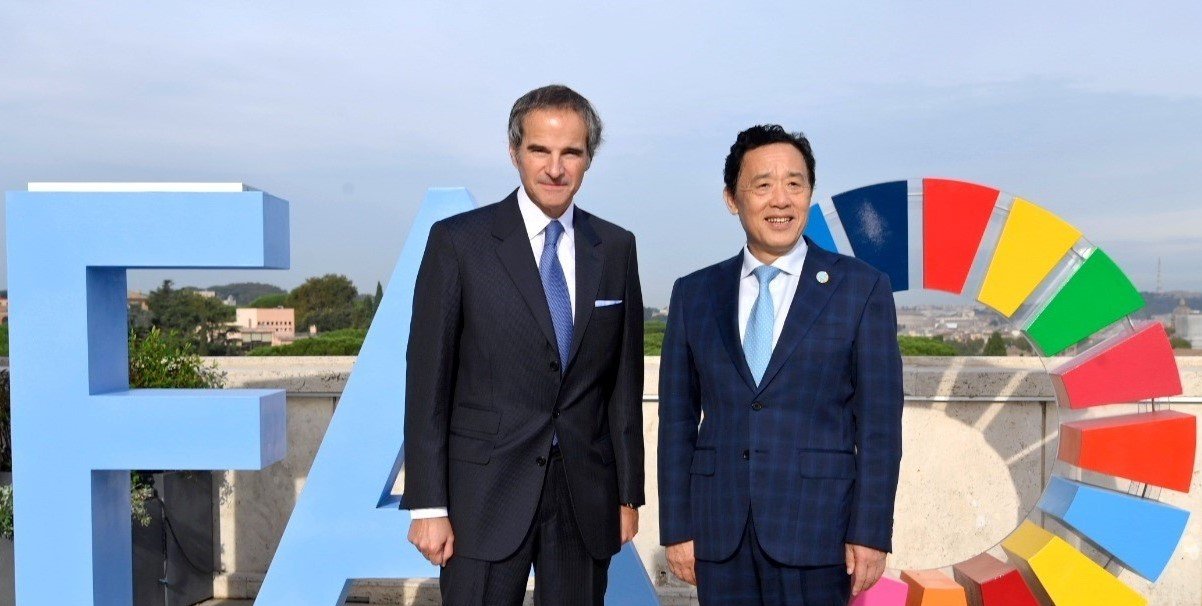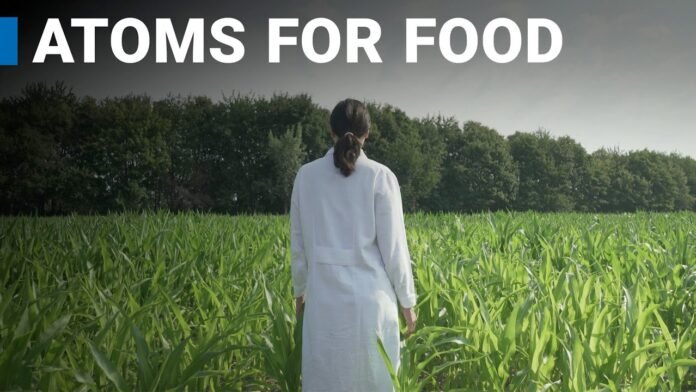ROME, OCTOBER 19 – The heads of FAO and IAEA have announced roday the new initiative to provide member countries with assistance in strategic planning, increasing food production, and food security. Atoms4Food was introduced during a special event on “Innovation Breakthroughs” held at the World Food Forum 2023, hosted in Rome by the UN agency for food and agriculture. The initiative is the result of a collaboration between the FAO and the International Atomic Energy Agency, and will be managed through the Joint FAO/IAEA Center for Nuclear Techniques in Food and Agriculture.
 “We are at an unprecedented moment when hunger and malnutrition are on the rise, posing a threat to humanity,” said FAO Director-General QU Dongyu and IAEA Director-General Rafael Mariano Grossi in a joint statement. “The Atoms4Food initiative aims to provide innovative solutions tailored to the specific needs and circumstances of member states, harnessing the benefits of nuclear technologies along with other advanced techniques.”
“We are at an unprecedented moment when hunger and malnutrition are on the rise, posing a threat to humanity,” said FAO Director-General QU Dongyu and IAEA Director-General Rafael Mariano Grossi in a joint statement. “The Atoms4Food initiative aims to provide innovative solutions tailored to the specific needs and circumstances of member states, harnessing the benefits of nuclear technologies along with other advanced techniques.”
Atoms4Food will support countries in using innovative nuclear techniques to enhance agricultural productivity, reduce food losses, ensure food security, improve nutrition, and adapt to climate change. It builds on joint FAO/IAEA programs to provide comprehensive tailored support to countries and will be delivered through mechanisms established by the IAEA and FAO, as well as other partners.
 “It is time to work together,” Qu stated, offering the new initiative to the broad network of FAO national offices. Grossi noted that Atoms4Food comes 70 years after President Dwight D. Eisenhower delivered his iconic “Atoms for Peace” speech and shares similar objectives. “One of the key manifestations of peace today is ensuring that everyone has food,” he said. Leveraging their respective comparative advantages, strategies, and research portfolios, the Joint FAO/IAEA Center for Nuclear Techniques in Food and Agriculture is already working to optimize laboratories dedicated to food and agriculture, human nutrition, food safety, and water resource management.
“It is time to work together,” Qu stated, offering the new initiative to the broad network of FAO national offices. Grossi noted that Atoms4Food comes 70 years after President Dwight D. Eisenhower delivered his iconic “Atoms for Peace” speech and shares similar objectives. “One of the key manifestations of peace today is ensuring that everyone has food,” he said. Leveraging their respective comparative advantages, strategies, and research portfolios, the Joint FAO/IAEA Center for Nuclear Techniques in Food and Agriculture is already working to optimize laboratories dedicated to food and agriculture, human nutrition, food safety, and water resource management.
FAO and IAEA have been collaborating since 1964, and their partnership stands out as one of the most effective among United Nations agencies, offering services such as sterile insect technology and isotope analysis for assessing nutrient and water use in the soil. The Atoms4Food initiative is ideally positioned to provide member states with innovative solutions in areas ranging from cultivation systems to natural resource management, tailored to their specific needs and circumstances.
Grossi outlined seven services for the benefit of member states, ranging from capacity development, crop varieties, soil and water management, animal health, pest control, food security, public health, and nutrition. “We know we have to use all the tools we have,” he said. Other innovative ideas launched during the World Food Forum session included a presentation by Cary Fowler, the U.S. Special Envoy for Global Food Security, on the “Vision for Adapted Crops and Soils” (VACS), an effort in Africa to identify underutilized indigenous food crops that can be the “crops of opportunity” of tomorrow, another by Professor Andrea Crisanti of the Imperial College on the use of gene drives to eradicate unwanted insects, and one by Ambassador Guang Defu, the Permanent Representative of China to the FAO, on his country’s experience and contribution to innovation in agri-food systems. (@OnuItalia)

